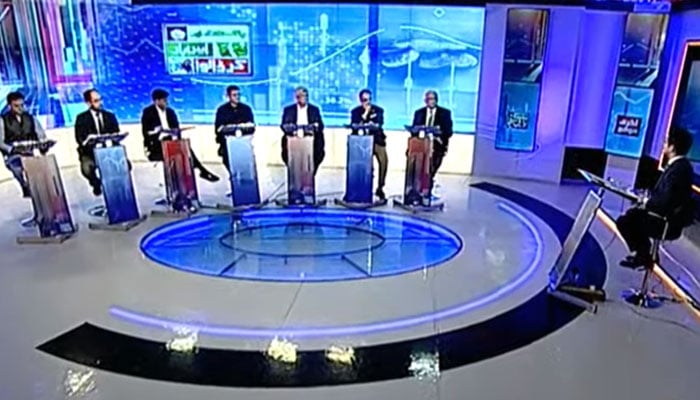Great Debate: Experts urge effective taxation, use of technology to overcome economic challenges
Pakistan faces difficult economic situation with its people suffering from sky-high inflation and depleting forex reserves
KARACHI: As Pakistan faces a difficult economic situation with its people suffering from sky-high inflation and economic indicators such as depleting forex reserves and stagnant exports painting a bleak picture, the financial experts and top businessmen of the country have urged focusing on effective tax collection and use of technology among other measures to over come the challenges.
To find solutions and broach discussion on these pressing issues, Geo News live broadcast ‘Great Debate’, Pakistan’s biggest and most important programme on economic issues.
‘Great Debate’ brought for its viewers the thoughts and opinion of the economists and top entrepreneurs of the country.
Senior journalist and analyst Shahzeb Khanzada hosted the ‘Great Debate’ live on Geo News.
Lucky Cement Chief Executive Officer (CEO) Muhammad Ali Tabba, Chairman of Banks Association Zafar Masud, Chairman of Arif Habib Group Arif Habib, President and CEO of Habib Bank Limited Nassir Salim, Economist Syed Ali Hasnain, Managing Director Systems Limited and CEO Asif Peer, Director of Gul Ahmed Textiles Ziad Bashir and Topline Securities CEOMuhammad Sohail participated in the programme.
Expressing his views during the debate, Masud highlighted Rs3.5 trillion leakages in the tax collection. He suggested that subsidies will have to be eliminated.
Meanwhile, Peer said that increase in employment is a source of hike in tax revenue.
“Provision of employment opportunities will increase income because the salaried class pays the most taxes,” he added.
Meanwhile, Bashir said that the industries have been burdened.
“Retailers’ share in the GDP is 17% but only 1% in tax,” he said.
Economist Hasnain was of the view that it wasn’t the country which is poor but the government.
“Today, 80% lending from the banks is going to the government,” he said, adding that the private sector doesn’t have the capability of taking loans.
Topline Securities CEO Mohammad Sohail said that there were leakages in the industries’ taxes.
“The global organisations are also saying that Pakistan’s tax to GDP ratio is low,” he said.
Sohail also suggested that jacking up the tax by Rs3000 billion to Rs4000 billion was not difficult.
Tabba said that Pakistan’s tax to GDP ratio is 9% but other countries in the region have 15% to 18%.
Habib said that super tax was imposed on the people who were already paying the taxes. He said that he suggested the prime minister to cut down the super tax by half.
“There are leakages of Rs20 billion in the steel sector alone,” he added.
Habib said Pakistan has the highest energy cost, interest rate and tax rates in the entire region. “Who will invest in such a situation,” he asked.
Masud said that the criticism that the “banks don’t focus much on the private sector” was right.
He said that taxes have been imposed on the real estate, agriculture and retail sectors but the collection is not done.
“95% of the fiscal deficit is funded by the banks,” he added.
He said that the dollar rate came down after the government established its writ.
“No protest will be staged if the government wants to tax the traders,” he added.
Asif Peer said that our vision of digitisation is declining. He said that tax collection will be easy when the supply chain is digitised.
At this, Ziad Bashir said that tax imposition shouldn’t be delayed amid fear of protests.
Meanwhile, Ali Hasnain said that discussion regarding imposing taxes wasn’t new and added that the taxation is the most regressive in Pakistan.
Mohammad Sohail said that the government has the data regarding non-tax payers but the problem is about implementation.
“Rs3000 billion to Rs4000 billion of tax can be collected through the use of force,” he suggested.
Meanwhile, Arif Habib suggested that there shouldn’t be a wealth tax in Pakistan or the people will move abroad. He said that taxes cannot be collected by increasing the tax rate. Instead, economic activity will have to be increased, he added.
Tabba argued that the industries were being given expensive electricity and gas. “How would the industries earn if they are already incurring losses,” he questioned.
“The industries are shrinking due to expensive electricity, gas and high taxes,” he said, while suggesting to cut down taxes and focus on those who abstain from paying the taxes.
Use of technology
Saleem said that the country would have to limit reliance on cash economy and make solid measures towards the achievement of digital Pakistan.
Meanwhile, Peer suggested use of technology for cutting down the expenses.
He said skilled people from the information technology (IT) sector are moving abroad.
“Technology needs to be focused on if we want to come out of the subsidy culture,” he said.
Privatisation
Habib said that the issues can be fixed very quickly as there was a lot of room for reforms. He said that privatisation has been the most successful in Pakistan.
Meanwhile, Masud said that the regulators of the companies which have to be privatised need to be strong.
There was no regulator in the aviation sector, he added.
He suggested that first regulators should be brought in the sectors which don’t have the regulators and then the privatisation should be done.
Meanwhile, Bashir suggested that local investment should be priortised for privatisation.
-
$44 billion Bitcoin blunder: Bithumb exchange apologizes for accidental payout
-
Global memory chip crunch puts spotlight on Apple; Will iPhone become more pricey?
-
Bitcoin plummets toward $60,000 as investors dump risky bets
-
Bitcoin crashes below $63K as regulatory pressure and market fears grow
-
Bitwise Crypto Industry innovators ETF: What investors should do in 2026?
-
Nintendo shares slide again as momentum fears grow
-
Gold, silver prices fallen sharply; What’s driving the drop?
-
Gold’s record climb: Experts question if its safety is ‘overstated’












